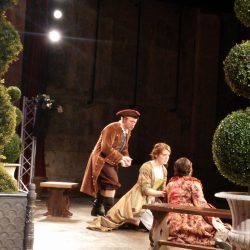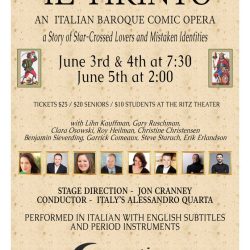REVIEW: Bernardo Pasquini’s “Il Tirinto” is proven worthy of resurrection.
From an aristocratic palace in the Castelli Romani, Italy, to the blasted concrete interior of the Ritz Theater in northeast Minneapolis: That is the extraordinary journey traveled by Italian composer Bernardo Pasquini’s “Il Tirinto,” a baroque opera first staged in 1672 by a society of moneyed suburbanites who had so much leisure time to spare they jokingly called themselves the “Good-for-Nothings.”
Pasquini’s opera subsequently fell into obscurity, and could easily have stayed there had not an American musician researching in a Modena library found a copy of the music, and transcribed it. His name was Garrick Comeaux, and on Friday evening his Twin Cities-based early music company Consortium Carissimi gave “Il Tirinto” what is almost certainly its first staging in over three centuries.
The piece is nominally a comedy, but shifts fascinatingly in perspective as moments of lightheartedness slip sideways into something murkier. Or vice versa: In a succession of scenes, the anguished keening of the love-struck Rosaura is deftly punctured by the earthy interjections of Lisa, an elderly serving maid whose worldly wisdom and practicality make emoting look plain ridiculous.
Lisa is sung by tenor Gary Ruschman, whose performance is a little masterpiece of comic vocalism and neat timing, expertly debunking the puffed-up posturing around him without ever going hammy. In the remarkable mid-opera intermezzo — where Pasquini has two characters review the action so far, in a fashion we would nowadays call postmodern — Ruschman finds an excellent comic foil in fellow tenor Steve Staruch, whose insults almost lead to fisticuffs.
As the intractable paterfamilias Filandro, Benjamin Sieverding dominated the evening vocally, his resonant, expressive bass a constant source of satisfaction. Tenor Roy Heilman was sweetly lyrical as the revenant Lucimoro, and both soprano Linh Kauffman and mezzo Christina Christensen brought allure and dignity to the lovelorn daughters. Director Jon Cranney kept both set and staging simple, with none of the spuriously “clever” business often foisted on baroque opera by those distrustful of its historical conventions.




